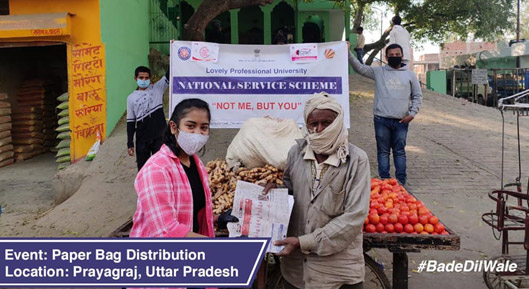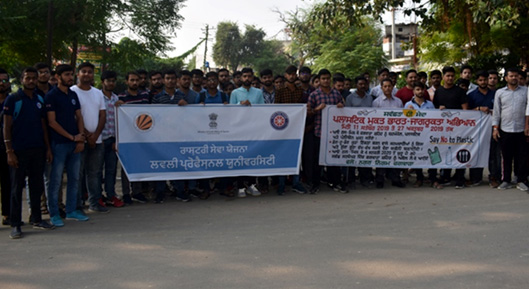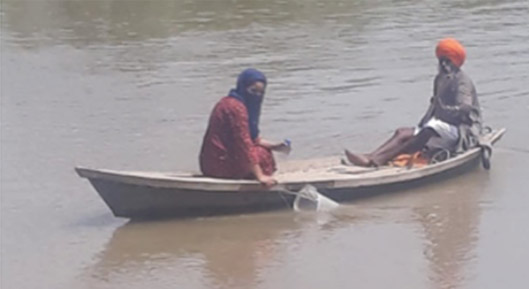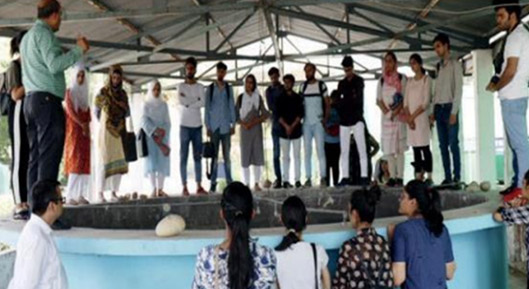The water of the seas and Oceans are vital for our planet’s life support and regulate the global climate system as we mostly rely for food, energy and water on these healthier resources. SDG 14 emphasis on responsible use of oceans, marine resources of the planet to protect the valuable aquatic resources and ecosystem. The implementation of SDG 14, "Life Below Water," faces several major challenges and requires attention in various areas such as Overfishing, Marine Pollution, Ocean Acidification, Climate Change etc. Every significant organization bears the responsibility of mitigating this degradation, and as a prominent educational institution, LPU takes comprehensive measures to alleviate this burden. These efforts encompass a wide range of initiatives, including the research and innovation projects, adoption of advanced technologies to minimize and control wastewater generation, conducting awareness campaigns among students, and educating the general public.

Our academic offerings are thoughtfully designed to align with the SDG 14. We believe in transforming education through a rigorous academic approach, a strong emphasis on practical learning, and a teaching methodology that focuses on tangible outcomes. Our benchmarked curriculum is strategically crafted to be industry-oriented, preparing our students to sustainable management of fisheries. Some of the courses being offered are Rainfed agriculture and watershed management, Wildlife conservation and management, Irrigation engineering, Environmental science and pollution control etc.
Lovely Professional University, has initiated a comprehensive and progressive research agenda aimed at addressing critical environmental challenges related to wastewater treatment, microplastics, municipal wastewater and sludge treatment, species invasion, and the growing concern of micro- and nano-plastic pollution in industrial wastewater. University is working towards research publication, intellectual property rights (patents), Govt. funded projects and consultancy project related to various aspects of improving and maintaining life blew water. Funding projects such as assessment of fluoride contamination in groundwater in Punjab using GIS and machine learning techniques, Identification of contaminants in textile industry effluent and their treatment methods funded by ISRO, Nikom chemicals respectively are some of the ongoing projects.
The university places a high priority on fostering global cooperation and engagement, which is reflected in our extensive network of collaborative initiatives and partnerships. Our commitment to expanding the horizons of knowledge and promoting international collaboration by Collaborative Research Projects, Faculty and Student Exchange programs, academic activities such as seminars, workshops, and conferences serves as a platform for the exchange of ideas and the dissemination of knowledge. These resources enable us to advance our initiatives and contribute to global knowledge. Some of the university’s collaboration with the organisations at Global and National level are Curtin University, Perth, Western Australia, Toshvin Analytical Private ltd, Mumbai etc.
Faculty members from university are providing their scientific input in reducing the deterioration of water and sustenance of life under water at local level as well. In the same line some of the distinctive faculties of university are involved as member for implementing development of fishery resources in Kapurthala district in Punjab under Pradhan Mantri Matsya Sampda Yojna (PMMSY) for the year’s 2020-21 to 2024-25. Pradhan Mantri Matsya Sampada Yojana is a scheme to bring about Blue Revolution through sustainable and responsible development of fisheries sector in India and has been approved at a total estimated investment of Rs. 20,050 crores for implementation from FY 2020-21 to FY 2024-25. Click here to view document.
Wetlands are home to both aquatic and terrestrial organisms, thus ensuring their survival is crucial. Harike wetland is extremely important not only for its ecological benefits but also due to its rich biodiversity. But the wetland is heading towards extinction due to degradation of environment at an alarming rate. So, in order to save this wetland from extinction, measures should be taken to prevent pollution and insure proper restoration. LPU university also supporting the establishment of more community-based programmes like project SAHYOG be initiated to revive natural water resources and wetlands. Considering the seriousness of the above critical matter, LPU researchers contributed by forming biological/non-biological matrix for growing especially suited plants (Hydrophytes) and renewing the characteristics of wetland (hydric) soils, LPU researchers and PhD scholars are trying to regenerate wetlands at Harike Lake.
LPU Research scholar is working on Thrust area “Spatial and Seasonal variation of Polychaete along the Macrophytic and Non-Macrophytic area of Chilika Lagoon, India”. In this research, samples were collected from the Gulf of Kachchh during three different seasons. Through analyzing meiofaunal communities in these diverse conditions, study aims to assess sediment quality and identify potential impacts of pollution and climate change. These sediment samples have been carefully processed in the laboratory to extract and identify the polychaetes present. The collected data would then be analyzed to determine the spatial and seasonal patterns of polychaete distribution.
Basai wetlands, located in Gurgaon city in Gurugram district of Haryana, India has been experiencing rapid shrinkage in its area over recent years due to continuous encroachment resulting from ever expanding city. The research, based on secondary data, examines the importance, threats and challenges faced by the wetland along with presenting a comparison between Basai and Sultanpur wetlands, which are located close to each other but in terms of conservation efforts display wide disparities. The paper highlights the extent of damage suffered by Basai wetlands on account of government and public apathy.
Microplastic estimation and Water pollution studies of nearby water bodies and its effects onto the Aquatic ecosystem
LPU supports research in the field of life under water and research is carried out in this relevant field by faculty and students. To support aquatic ecosystem through education, LPU is providing a compulsory input of environmental studies to its students through its academic programs. These courses help students to understand aquatic ecosystem in better way. LPU researchers are contributing their knowledge enhancement through research in the field of microplastic its estimation and water pollution studies of nearby water bodies and its effects onto the living organisms.
Single use plastic is banned in the campus. Awareness signages are also provided at various locations of the campus. Initiative has been taken by LPUNSS volunteers to raise awareness about the environmental issues caused by plastic bags. Using handmade paper bags made from newspapers is an eco-friendly alternative to plastic bags, and distributed them in more than 20 states of India is a commendable effort to reduce plastic pollution. This initiative is a positive step towards a cleaner and more sustainable future.
University aims at minimizing and addressing the acidification of water bodies. Awareness of maintaining the sustainable approach toward the conservation of Aquatic ecosystem and Its biodiversity in the private sector is still low. LPU framed its future targets to meet the goals as assigned by UN SDG’s governing body and working in line with the UN SDG 14 to achieve the goal by 2029.
In conclusion, LPU makes every effort to improve for life of species present under water through the sustainable utilization and conservation of aquatic resources. LPU is continuously creating awareness for the cleanliness and betterment in the health of water bodies among the students and local areas.
Socio-Economic
Contribution
28000+
LOW INCOME STUDENTSRECIEVING FINIANCIAL AID
20+
ADOPTED VILLAGESAND SLUMS
100+
STARTUPS BYSTUDENTS
100+
SCHOLARSHIPS OFFERED(IN CRORES RS.)







